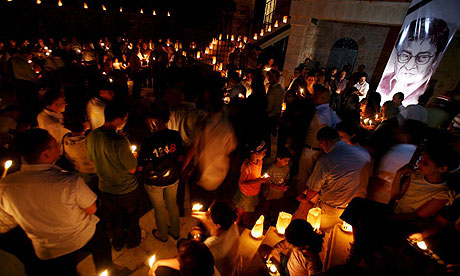
For the last 12 years of his life, Mahmoud Darwish was my neighbour. He was a shy, private man who was rarely ever seen in public events unless he was reading his poetry. I served with him on the board of the literary magazine, Karmil, which he edited. Except for these work meetings, I rarely saw Darwish. Sometimes I would come across him taking a walk around the hills of Ramallah; sometimes at the house of mutual friends, but never in public places, restaurants or cafes.
The opportunity to find out more about my neighbour came when we were both under curfew during the invasion of Ramallah by the Israeli army in 2002. It was then that I got a call from the aptly named Bomb magazine in the US to conduct an interview with Darwish. I readily accepted hoping that through an intimate one-to-one discussion I would get to know my famous neighbour better.
We just had a few hours in the morning when the Israeli army lifted the curfew to allow people to shop. I asked Mahmoud to come to my house for the interview and he agreed. As always, he was immaculately dressed but, like all of us, he looked tense and concerned that we finish on time so that he could make it back to his house. We ended up spending three hours together, where I was able to find out how he was managing to write under these conditions.
He described to me his poem State of Siege, which he wrote in response to the Israeli invasion. It was "a poet's journal that deals with resisting the occupation through searching for beauty in poetics and beauty in nature. It was a way of resisting military violence through poetry. The victory of the permanent, the everlasting, the eternal, over the siege and the violence." Hearing him speak, I realised how fortunate I was to have found a kindred soul who was struggling with the same difficult issues I was having in my attempts to write about the invasion.
He was adamant that Palestinians "cannot be defined by our relationship, positive or negative, to Israel. We have our own identity." In his diaries, A River Dies of Thirst, just out from Saqi, under the entry entitled "If We Want" Darwish writes: "We will become a people when a writer can look up at the stars without saying, 'Our country is loftier and more beautiful.'"
But this refusal to be limited by the Palestinian relationship with Israel was not a strategy of avoidance. The struggle for freedom was always central to Darwish's work. In 2002, he confronted the invasion directly in State of Siege, where he wrote:
(to a killer:) If you'd contemplated the victim's face
and thought, you would have remembered your mother in the gas
chamber, you would have liberated yourself from the rifle's wisdom
and changed your mind: this isn't how identity is reclaimed.
In much of his poetry Darwish affirmed his own and his people's reality yet he did not deny that of the Other. In the same poem he addresses the Israeli soldier:
You standing at the doorsteps, enter
and drink Arabic coffee with us
(you might sense you're human like us)
you standing at the doorsteps of houses,
get out of our mornings,
we need reassurance that we
are human like you!
I was at last year's Edinburgh Book festival when the sad news came about the failure of Darwish's heart operation and his death at the age of 66. Throughout his lifetime, the Jewish Israeli public continued to refuse to hear him and rarely allowed him to visit Haifa, the city of his early manhood. There was an outcry in Israel when one of his poems was introduced into the Israeli school curriculum. The only commemoration of his death came from his fellow Palestinians as they walked under the watchful eyes of the Israeli police to his destroyed village of Birwa. No one in the Israeli establishment marked the death of the most humane of poets, who had tried in his poetry to reach out to them and humanise Israelis to his fellow Palestinians.

